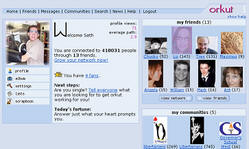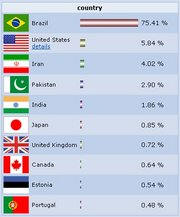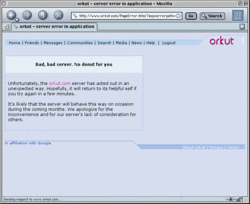orkut
From Wikipedia the free encyclopedia, by MultiMedia

orkut is an Internet social network service run by
Google and named after its creator, Google employee Orkut Büyükkökten. It
claims to be designed to help users meet new friends and maintain existing
relationships. Similar to Friendster, orkut goes a step further by
permitting "communities" of users. It is also invitation-only: users must be
invited to join the community by someone already there.

Users of orkut can maintain profiles, keep in touch with friends online
and participate in communities, as this screenshot shows.
History
orkut was quietly launched on January 22, 2004 by Google, the
search engine company. Orkut Büyükkökten, a
Turkish software engineer, developed it as an independent project while
working at Google (permitted by its policy). Some discomfort with this
exists among users and potential users of orkut, especially since Google's
other noteworthy product of 2004, the Web-based email client
Gmail, allows the company to automatically scan the
text of users' private emails in order to target ads toward them.
While previously working for Affinity Engines, he had developed a similar
system, InCircle, intended for use by university alumni groups. In late June
2004, Affinity Engines filed suit against Google, claiming that Büyükkökten
and Google based orkut on inCircle code. The
allegation is based on the presence of 9 identical bugs in orkut that also
exist in InCircle.
Originally, the orkut community was felt to be elite, because its membership
is by invitation only. However, at the end of July 2004 orkut surpassed the
1,000,000 member mark, and at the end of September it surpassed the
2,000,000 mark. As of July 2005, 73% of orkut's members were from Brazil,
followed by 6% from the United States, 5% from Iran and 3% from Pakistan.
Brazilians were below 50% from August 9 to August 20, 2004. It is believed
that this happened because a lot of the Brazilian users had changed their
nationality to something else due to a malicious hoax, telling that users
with their countries set to Brazil got slower speeds and a greater chance of
getting an error page.
While the intended invitation method was supposed to be e-mail between two
acquitances, invitations to orkut are obtainable via the web with a few days
worth of diligence, just like Gmail invites.
orkut's social status is questionable, because various people frequently try
to add strangers to their own pool of friends, more often than not just to
increase the number indicating their number of friends next to their name in
their profile. Many "add-me" communities exist, solely for this purpose. A
large number of bogus, clones, fake, invisible and "orphaned" profiles also
exist.
Controversy
Brazilian invasion
Main article: Brazilian Internet Phenomenon
The orkut community has been watching a large surge of Brazilian users
registering on its service. This is a known and curious fact, and it is
being the target of disappointment of many users from other countries,
including the United States. The number of Brazilian orkut users has reached
approximately 73.25% of the total of users, followed by United States, with
about 9.93%. Due to the number of Brazilian users and communities in the
Portuguese language, users from other parts of the world became upset with
the service, when it established Portuguese as the first "alternate default
language," (as English was the primary default language) prompting many
community owners to enforce an english only posting policy. Some went as far
as to start online communities and discussion groups dedicated to complain
about this phenomenon. Hoaxes have also
been spread, with the intention of tricking Brazilian users to change their
nationality in orkut. Actually, many Brazilian users change their
nationality in orkut, confusing other members when using the Friends Search
tool. As a reaction to this surge of Brazilian users, orkut recently
introduced Portuguese as a second language to its interface, due to
countless requests. The brazilian takeover has been documented elsewhere:
.
The reasons for this phenomenon apparently follows the Brazilian Internet
Phenomenon.
Services such as weblogs and photoblogs are now very popular with
Brazilian users as well. For example, it's not hard to see Internet searches
within the Brazilian territory returning several results pointing to weblog
entries. That is seldom seen in other parts of the world. The popularity of
such services
in Brazil intrigues many people, making this phenomenon worthy of study.
According to statistics orkut has turned most popular in little
Eastern-European country Estonia where a little more than 3% (June 2005) of
the population are registered orkut users. Brazil holds the second place
(about 2.5% of the population in the south east of the country). All the
other countries in top 10 list have users less than 0.5%.
There have been a few reported cases of crime resulting from orkut. Police
case involving orkut in Brazil where members were accused of racism.
Drug trafficking charges have been filed against ten people in Brazil after
authorities discovered them allegedly using the site to sell drugs.
Some complaints that have been made against Brazilians include the cloning
of profiles; a person might have thousands of them, even though the
disclaimer states that only one is allowed; the creation of joke and
defamatory profiles and communities, confusing foreigners in Community
Browsing; the selection of other countries in the profile, confusing actual
residents of those countries in Friends Search; the "invasion" of
English-language communities; and the vandalizing and flooding of the scrap
books. This behavior is not limited to Brazilians, however, to some it seems
incredible due to the high concentration of Brazilians. It is possible that
the percentages of misuse are no higher on orkut than on any similar
English-language site.
In a recent interview to a Brazilian news site the creator of orkut said
he doesn't understand the phenomenon and complains about the fact that
North-American press and users are ignoring the service and using similar
services like
Friendster and thefacebook. He also noted that Brazil is actually the main
focus of orkut.

The Brazilian Invasion: The numbers show the recent phenomenon
Hate groups
There has recently been controversy revolving around the use of Orkut by
various hate groups. Virulent racists allegedly have a solid following
there. Because of the invitation-only structure, closed groups of
like-minded people are able to thrive. Several hate communities focused on
racism, Nazism, white supremacy and pedophilia have been deleted due to
guideline violation. However the number of these communities and profiles
doesn't stop growing because they can be very easily created and it is hard
for orkut to check them.
Copyright disclaimer
orkut's terms of service state:
By submitting, posting or displaying any Materials on or through the
orkut.com service, you automatically grant to us a worldwide,
non-exclusive, sublicenseable, transferable, royalty-free, perpetual,
irrevocable right to copy, distribute, create derivative works of,
publicly perform and display such Materials.
This technically means that any contribution to the orkut community (be
it forum posts or photos) also becomes the property of the site owner. This
policy offended many dedicated orkut users, some who terminated their
accounts as a protest. Interesting detail: friendster's terms of service
contain almost the same text.
Iranian censorship
Orkut is very popular in Iran (even a few former government politicians
had profiles there as a matter of propaganda among youth), but the website
is blocked by its government. To get around this block, sites such as
"orkutproxy.com" (now defunct) were made for Iranian users. Other websites
such as Yahoo! Groups and Google Groups have communities dedicated to
receiving updates on the newest location of Iran's Orkut proxy. Though it
was once possible to bypass governmental blockage of Orkut, the site has
closed its HTTPS pages on all anonymous proxies. Now it is almost impossible
for ordinary users to visit this site inside Iran.
Jail
One of orkut's most infamous features was the "jail." Users who misbehave
or are reported to misbehave are "jailed." Their account was suspended,
their site access was reasonably limited, and their current profile picture
was temporarily replaced with a silhouette of a man behind prison bars.
Although this serves a useful purpose, the way users are selected to be
jailed has caused heated discussions and complaints among orkut users: every
user's profile has a "Report as Bogus" button, which, if pressed,
automatically flags the user to be jailed. Conceivably, this means that
anyone can be jailed at any time by pressing a single button.
Another way to be jailed is to "act like a robot." To safeguard against bots
and other automation, users who add friends or join communities in a very
quick or repetitive manner, or perform similar actions, are jailed. Often,
however, this happens when a new user is invited to join the site and finds
many people he/she already knows and tries to add them as friends
immediately.
Users who were jailed were not informed of the reason, nor were they
notified that they had been jailed. Jailing usually did not last long (up to
24 hours in most cases), but was often disturbing to users, as there is no
direct contact to the orkut team (their contact form only answers with
template emails) and jailing limits one to waiting or posting in a
designated forum.
Ironically, site users once reported that Orkut Büyükkökten, the creator of
the site, was jailed.
The jail system is actually deactivated due to its inneficiency.
Speed and reliability
Due to the massive load on the server, orkut has a bad habit of breaking
down, running slow or returning one of its infamous "Bad, bad server. No
donut for you." error messages. These slowdowns mostly can be noticed during
the day hours in America (south and north), which probably explains the
reason as well, as more than 80% of the orkut users are from the American
continent, more than 70% from Brazil alone.

The "Bad, bad server" screen, one of the most well-known sights on orkut.
Flooders and Fakes profiles
As the number of orkut users increased and due to the low reliability and
security of the site, people started to create fake and clone profiles,
something that can be achineved just in a matter of a few minutes. Due to
the large number of users and the deactivation of the jail, the profiles
were often left unremoved, or when removed, they were recreated easily.
These profiles are normally created to troll, to spam, to flood or just for
fun. It isn't hard to find a users owning more than one profiles. Some
persons stated that they owns hundreds of profiles.
Later, the clones started to flood communities and scrapbooks by submitting
topics or scraps hundreds or thousands of times manually. Shortly
thereafter, by simply examining the source code of the page, they found it
was possibly to create Javascript codes to automatically flood the site.
Soon (given that orkut is a complex social network), flooding wars started
to occur frequently between some fake antagonic groups.
On January 1, 2005 a hacker attacked orkut, stealing community ownership
rights, using phishing techniques. Eventually, various phishing sites were
developed with the intent of stealing other people's accounts and
communities. A couple of months later, invisible profiles, communities and
topics started to appear in orkut. This was possible to be achieved by some
HTML escaping codes and 1x1 pixel photos to fool the engine behind the site.
In the August of 2005 a freeware program made in Delphi called Floodtudo
("tudo" in portuguese means "everything") was created specifically for
flooding orkut. It quickly spread through the users and was easily
downloadable (the most common Floodtudo versions were 1.2, 1.5, 2.0 and
2.2). As this program was massively used by thousands of spammers, a big
spam wave struck orkut in September and October of 2005.
As the flooding of orkut was getting out of control, the developers
implemented some features in order to stop this, such as not allowing two or
more verbatim topics or scrapbook entries to be submitted, forcing the user
to wait before posting another topic or scrapbook entry, and the usage of
captchas. They gave more rights to community moderators as well, so not they
can just ban users instead of relying the developers to remove them, and now
community moderators are able mass-delete posts too.
Other ways of profile and community attacks still exist, like testimonial
flooding, attacks on scrapbook and member counters, multi-profile floods and
social engineering.
Many reasons exist for flooding. As a social network, it's obvious that
people have or develop enemies on the site, but some of them attack simply
for the sake of trolling. Flooding is one of the reasons for orkut's poor
site performance, as it causes a heavy overload on orkut servers, decreasing
their reliability even more.
Name meanings
- In Turkish, Orkut means "the holy meeting place"
- In Finnish slang, it means "orgasms"
See also
External links
References
Google Guide made by MultiMedia | Free content and software
This guide is licensed under the GNU
Free Documentation License. It uses material from the Wikipedia.
|




